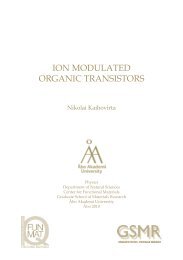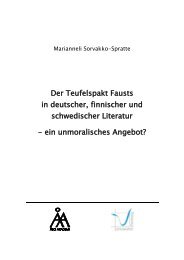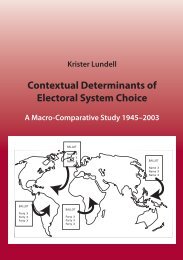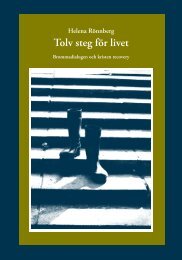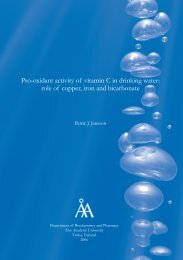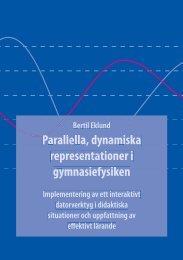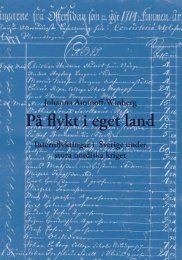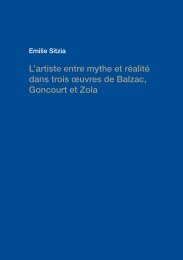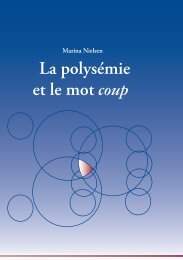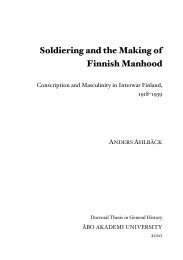90Menschen. 155 Die Seele leitet den Körper und seine Sinne und macht sielebendig. 156Von den zwei Teilen des Menschen ist nur der Körper sterblich, welcheseine Folge des Sündenfalls ist. 157 Im Tod trennt sich die Seele vomKörper. 158 Die Seele und der Körper unterscheiden sich voneinander inihren Dimensionen. 159 Sie <strong>bei</strong>de sind geschaffene Substanzen, aber die155 “Porro hominem constare anima et corpore, extra controversiam esse debet; atqueanimae nomine essentiam imortalem, creatam tamen intelligo, quae nobilior eius pars est.”Ixv2156 “Porro ex Scriptura ante docuimus esse substantiam incorpoream: nunc addendumest, quanvis proprie loco non comprehendatur, corpori tamen inditam illic quasi in domiciliohabitare: non tantum ut omnes eius partes animet, et organa reddat apta et utilia suis actionibus,sed etiam ut primatum in regenda hominis vita teneat: nec solum quoad officiaterrenae vitae, sed ut ad Deum colendum simul excitet.” Ixv6157 “Hinc fit ut mortem horreamus: quia naturaliter expeti non potest dissoluti: quaeadversa est naturae. Transiturus quidem fuit primus homo in meliorem vitam, si integerstetisset: verum nulla tunc fuisset animae a corpore migratio, nulla corruptio, nulla interitusspecies, nulla denique mutatio violenta.” CmGen 3:19 CO 23, 77 — Helm 2004, 132–133“Rather than attempt a rational proof of immortality, he argues from the key biblical ideathat man was made in God's image. As God is a spirit so man, made in his image, is a spirit.Whether or not <strong>Calvin</strong> thinks that it follows from this that consciousness is essential to thesoul, he certainly holds that consciousness is [133} essential, so affirming the soul's sleep atdeath is equivalent to denying its continued existence. The perception of good and evil isalso essential to the soul, at least the soul of a normal adult, and this perception survives thedeath of the body, and so death is not equivalent to the soul's annihilation.”158 “Longe aliter Scriptura, quae corpus tugurio comparat ex quo nos migrare dicitquum morimur: quia ab ea parte nos aestimat quae nos a brutis animalibus discernit. SicPetrus morti propinquus dicit tempus venisse quo tabernaculum suum deponat [2. Pet. 1. c.14]. Paulus vero de fidelibus loquens, postquam dixit, Ubi terrestris domus nostra dissolutafuerit, nobis esse aedificium in caelis [2. Corin. 5. a. 1]: adiungit nos peregrinari a Dominoquandiu manemus in corpore, sed expetere Dei praesentiam in absentia corporis. Nisisuperstites essent animae corponibus, quid est quod habet Deum praesentem ubi est acorpore separatum?” IIIxxv6. — “But, Clavin explained, with the death of the body the warbetween the spirit and the flesh ceases and the soul is set free from imputies and is trulyeternal.” Schreiner 1991, 61.159 “De loco non minus inepta et futilis est quaestio: quando scimus non eam esseanimae dimensionem quam corporis.” IIIxxv6, “ Alii eius [=animae] potentias ac facultatesita praesenti vitae affigunt, ut extra corpus nihil reliquum faciant. Porro ex Scriptura antedocuimus esse substantiam incorpoream: nunc ad-dendum est, quanvis proprie loco noncomprehendatur, corpori tamen inditam illic quasi in domicilio habitare:” Ixv6
91Seele ist unsterblich 160 und der Körper sterblich. 161 <strong>Calvin</strong> beschreibt denKörper in Bezug auf die Seele als Gefängnis, 162 als Hütte oder Zelt, 163 alsHaus 164 und als Kerker. 165 Die Seele weilt also nur provisorisch im Körper,und der Körper hält sie fest.<strong>Calvin</strong> benutzt jedoch nicht immer die Worte “Seele” und “Körper”.Neben dem “Körper” hat er manchmal das Wort “Fleisch” (caro), wenn erzum Beispiel feststellt, dass der Mensch “in diesem Fleisch” dieVollkommenheit nicht erreichen kann, 166 oder wenn er <strong>bei</strong> der Auf-160 "Porro hominem constare anima et corpore, extra controversiam esse debet; atqueanimae nomine essentiam imortalem, creatam tamen intelligo," Ixv2 — “Against those whoargued that the soul was merely a vital power unable to subsist without a body, <strong>Calvin</strong>argued for the real and substantial exixstence of the soul distinct from the flesh. In thisargument <strong>Calvin</strong> maintained that the imge of God is not a part of the body and is not to beequated with the dominion that God gave humans over the beasts.” Schreiner 1991, 61.161 “morte renovatum in omnes dum exuent mortale corpus:” IIIxxv8162 “Proinde donec in carcere corporis nostri habitabimus, assidue nobis cum naturaenostrae corruptae vitiis luctandum est, adeoque cum naturali nostra anima.” IIIiii20, “Sedquoniam nemini tantum suppetit in terreno hoc corporis carcere roboris,” IIIvi5, “Si liberaria corpore est asseri in solidam libertatem, quid aliud est corpus quam carcer?” IIIix4 — “Theimago Dei, he insested, applies to the soul which dwells in the body as in a prison.” Schreiner1991, 61.163 “Longe aliter Scriptura, quae corpus tugurio comparat ex quo nos migrare dicitquum morimur: quia ab ea parte nos aestimat quae nos a brutis animalibus discernit. SicPetrus morti propinquus dicit tempus venisse quo tabernaculum suum deponat [2. Pet. 1. c.14].” IIIxxv6, “Nam si cogitemus hoc instabile, vitiosum, corruptibile, caducum, emarcidum,putre corponis nostri tabernaculum ideo dissolvi ut in firmam, perfectam, incorruptibilem,caelestem denique gloriam mox instauretur: an non ardenter fides expetere coget quodnatura reformidat?” IIIix5164 " corpori tamen inditam illic quasi in domicilio habitare:" Ixv6 — “Although notlocalisable, the soul, in his view, is placed in a body as if it were its home.” Backus 2003, 92.165 "et morte migrare ex tabernaculo carnis:" Ixv2; — Doumergue IV, 310–311 stellt dieErgebnisse Schulzes vor, nach denen <strong>Calvin</strong> den Körper mit einem Zelt, einer Hütte undeinen Kerker vergleicht. S. auch Helm 2004 “Whatever <strong>Calvin</strong> thinks about what can andcannot now be proved about the soul by reason, he clearly affirms a platonized dualism,claiming that the soul dwells in the body ‘as in a house', a 'prison house'. He also clearly hasmore confidence in the ability of some philosophers to reason to the soul's immortality thanhe has in their ability to reason to the form that that immortality will take in the post-mortemstate; namely, in a resurrected body.” (131)166 “Quum enim perfectio nulla obtingere nobis possit quandiu hac carne indutisumus,” IIIxiv10
- Seite 1:
Kalle ElonheimoDas Universale Recht
- Seite 4:
4.2.3. Von der Erkenntnis zur Aktio
- Seite 7 und 8:
31. EINLEITUNG“Porro haec ipsa qu
- Seite 9 und 10:
5Von Orléans wechselte der junge H
- Seite 11 und 12:
7Studien die Denkweise der Rechtswi
- Seite 13 und 14:
9selben Zeit erschien auch die erst
- Seite 15 und 16:
11bachtung wird dadurch bestätigt,
- Seite 17 und 18:
13zum Naturrecht zu rekonstruieren.
- Seite 19 und 20:
15Prinzipien, die dem Menschen inne
- Seite 21 und 22:
17Ebenso gibt er zu, dass Calvin si
- Seite 23 und 24:
19positiven, insbesondere staatlich
- Seite 25 und 26:
21und miteinander verglichen. Dabei
- Seite 27 und 28:
23Wie schon der Name des Werkes ver
- Seite 29:
25Kommentare und Predigten zu Mose-
- Seite 35 und 36:
31Seine weiteren Quellen hat Gratia
- Seite 37 und 38:
33Einrichtung kann zum Naturrecht i
- Seite 39 und 40:
35ist. 20 So sind in seinem Denken
- Seite 41 und 42:
37Der freie auf das Gute um des Gut
- Seite 43 und 44: 39unveränderlich, aber was die Hin
- Seite 45 und 46: 41Sinne ist: in Bezug zu Gott und i
- Seite 47 und 48: 43Naturrechtslehren, die einzelne R
- Seite 49 und 50: 45Dinge außerhalb Gottes betrachte
- Seite 51 und 52: 47Fragen, die man mit Hilfe der ant
- Seite 53 und 54: 49beschädigen, wenn man dem Naturr
- Seite 55 und 56: 51Menschen dazu bringt, dass er dem
- Seite 57 und 58: 53Erkenntnisse teilt er noch in zwe
- Seite 59 und 60: 55Der schöpfende Gott ist der drei
- Seite 61 und 62: 57glauben. Wer nicht glaubt, denkt,
- Seite 63 und 64: 59vollen Wirken ist Gott eine absol
- Seite 65 und 66: 61ordo naturae, kann aber auch bede
- Seite 67 und 68: 63erstreckt. 50 Er begründet sein
- Seite 69 und 70: 65schriften über sexuelle Sittlich
- Seite 71 und 72: 67In einer tieferen Bedeutung zeigt
- Seite 73 und 74: 69Doppelgebot der Liebe bringt die
- Seite 75 und 76: 71Katechismus vom Jahre 1537 hat Ca
- Seite 77 und 78: 733.2.5. Fokussiertes GesetzGott ha
- Seite 79 und 80: 75Die Rechtsvorschriften des Alten
- Seite 81 und 82: 77- potentia ordinata Dei: ob Gott
- Seite 83 und 84: 79v. Chr.) nennt. 127 Die Aufkläru
- Seite 85 und 86: 81Zeremoniegesetz, dessen Gültigke
- Seite 87 und 88: 83Wenn es um die Folgen des Sünden
- Seite 89 und 90: 85vieler Völker besser ist, ein st
- Seite 91 und 92: 87erhaltenen Fähigkeiten sind dem
- Seite 93: 894.1.2. Dualistisches Menschenbild
- Seite 97 und 98: 93wenn er über “unsterblichen Ge
- Seite 99 und 100: 95Menschen zur Erfüllung der irdis
- Seite 101 und 102: 97aber die Einteilung in zwei Teile
- Seite 103 und 104: 99dem Bild Gottes und der Vernunft
- Seite 105 und 106: 101Bild, in dem zwei Welten mit je
- Seite 107 und 108: 103kunst, die zum Vorschein bringen
- Seite 109 und 110: 105Oben haben wir schon festgestell
- Seite 111 und 112: 1074.2.2. Der WilleDie andere Fähi
- Seite 113 und 114: 109leitende Königin für den Wille
- Seite 115 und 116: 111Wirken hat, aber auch diese Frei
- Seite 117 und 118: 113Begriffsgeschichte anhand der Li
- Seite 119 und 120: 115In das mittelalterliche Denken k
- Seite 121 und 122: 117nicht unter das Gewissen (syneid
- Seite 123 und 124: 119ein Empfinden über das Urteil G
- Seite 125 und 126: 121seinen Sitz im Menschen und wirk
- Seite 127 und 128: 123Obwohl das Gewissen für Calvin
- Seite 129 und 130: 125nehmen, aber anderseits kann er
- Seite 131 und 132: 127verdorben, nicht kann. 289 Der V
- Seite 133 und 134: 129Gerechtigkeit des Gesetzes in ih
- Seite 135 und 136: 131stellungen billigen und mit Belo
- Seite 137 und 138: 133Im Lichte jener Predigt scheint
- Seite 139 und 140: 1355. WIRKSAMKEIT DES UNIVERSALEN R
- Seite 141 und 142: 137bedeutet, dass der Mensch sie au
- Seite 143 und 144: 139Nicht-Gläubige können moralisc
- Seite 145 und 146:
141gemeinschaftliche Gebrauch des G
- Seite 147 und 148:
143zusammen betrachte, komme ich zu
- Seite 149 und 150:
145der vollständigen Einhaltung de
- Seite 151 und 152:
147geholfen wird. 41 Die Menschlich
- Seite 153 und 154:
149Fluch und den Tod. Nach Calvin i
- Seite 155 und 156:
151der negativen Form und in der In
- Seite 157 und 158:
153untergeordnete Stellung als Ausd
- Seite 159 und 160:
155alterliche weltliche als auch ka
- Seite 161 und 162:
157versuche ich, die Stellung des N
- Seite 163 und 164:
159stück oder Gebäude und hält e
- Seite 165 und 166:
161denken viele, dass sie frei und
- Seite 167 und 168:
163Wenn Calvin, anders als es im Ch
- Seite 169 und 170:
165keitsbild von ihm: in der Lehre
- Seite 171 und 172:
167Die Richtschnur für Gesetze bes
- Seite 173 und 174:
169Calvin schließt sich der Tradit
- Seite 175 und 176:
171Das Gesetz hat im Denken Calvins
- Seite 177 und 178:
173gerechnet. Obwohl die ganze Natu
- Seite 179 und 180:
175Entscheidung entzogen werden, we
- Seite 181 und 182:
177Gewissen vor allem ein geistlich
- Seite 183 und 184:
179Lage eines Menschen aus zu sagen
- Seite 185 und 186:
181Zinsnahmeverboten verpflichten n
- Seite 187 und 188:
1837. QUELLEN, LITERATUR UND ANHANG
- Seite 189 und 190:
185CCCM Corpus Christianorum, Conti
- Seite 191 und 192:
1871963 L'homme et la femme dans la
- Seite 193 und 194:
189VJean Calvin. Les hommes et les
- Seite 195 und 196:
191Lane, A.N.S.1981 Calvin's Use of
- Seite 197 und 198:
193Exiztenz heute, N.F. 152. Münch
- Seite 199 und 200:
195Positionen. Opladen.Veijola, Tim
- Seite 201 und 202:
197Aristoteles . . . . . . . . . .
- Seite 203 und 204:
1997.5. Anhang: Calvins Gliederung
- Seite 205 und 206:
201Lev 19:17 / Lev 19:18 / Lev 19:1
- Seite 207:
"Porro haec ipsa quae ex duabus tab



